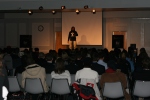It takes a movement to make masses of minds mold together at the same time
From labor to LGBT rights
And from ACT UP to Civil Rights
The need to prove our humanity has withstood the test of time
From the beginning of time we have occupied all streets
Fighting for the rights of our babies so in peace they can all sleep
Our love of liberty made the Egyptian scarab sing for the Arab spring
Because the time is always right to do right…so said a King
We waged wars of words for Wagner acts
Laboring laboriously for those looking to live off of our backs
And now we gloriously gleam with the light of our freedom
Knowing too many still live in the dark…but we see them
From the classroom to the metro, when we look back in retro
We see human beings who grasped at freedom and wouldn’t let go
Moving as one we make mole hills out of mountains of societal injustice
Knowing in the end that all we have and need is just us
From Ohio to Cairo and from Colombia to Congo
When the people choose to lead, the leaders will follow
It only takes 1% of the people to push for change
But luckily we have the 99% fed up with the game,
Fed up with living in shame,
Fed up with being the blame,
Fed up with being pawns in a big business chess game
So we declare checkmate on corporate kings
Because we know all too well why the caged bird sings
We know all too well what liberation brings
Equality under the law
Whether we believe in Jesus or Allah
Denying equal rights to everyone is humankind’s biggest flaw
But as long as there is inequality there will be we
The seekers of change shining from sea to shining sea
The bringers of rain on the parade of poverty
The ones tired of seeing abuse to democracy
They said “freedom for all” but we knew it was hypocrisy
So we march and declare our rights in the face of adversity
In the face of stoning and lynching we stand proud of our being
Lady Liberty was blindfolded but even now she is seeing
From the U.S. to Uganda, we’re tired of the homophobia
Tired of misplaced anger and xenophobia
Throughout time there was we fighting for humanity
From slavery to genocides, protesting this insanity
From Armenia to the Holocaust, never forgetting
From Rwanda to the Sudan, never accepting
Never complacent when injustice sits adjacent
To our conscience we see the writing of war on the wall and erase it
We believe that peace is possible
That equal rights are plausible
And we will never believe that social justice is optional
